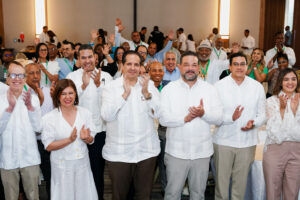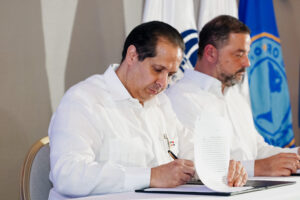Punta Cana, Dominican Republic, October 10, 2024 – At the First International Congress on Climate Change, Air Quality and Health, national and international experts, together with representatives of government and social agencies, are addressing the current challenges that climate change poses to public health.
This meeting is the result of an ambitious collaboration co-led by the PAHO Office in the Dominican Republic and DHE/CE, with funding from the United States CDC.
Under the motto “Clean air, healthy communities, well-being for all”, this event aims to develop joint solutions to mitigate the effects of climate change in the region and promote immediate action.
At this event, the Ministries of Health, represented by its Minister, Víctor Atallah , and the Ministry of the Environment, represented by its Minister, Paíno Henríquez , signed an agreement to work together on issues related to the environment, climate change and health.
During his speech, the Minister of Health, Víctor Atallah , highlighted that the Dominican Republic has adopted a comprehensive approach to health with environmental policies, supported, among other actions, by the implementation of the National One Health Strategy, a framework that recognizes the interdependence between human, animal and environmental health.

“This approach not only seeks to reduce the risks arising from pollution and climate change, but also promotes sustainable development, allowing our communities to thrive in a resilient manner,” he added.
He said that one of the key pillars of the national strategy is the improvement of air quality, for which they have launched joint initiatives with the Ministry of Environment to establish a national air quality monitoring system, which allows detecting and addressing in a preventive manner the dangerous levels of pollution in the main cities of the country, and invited every citizen to take care of the environment as it is everyone’s home.
Meanwhile, the Minister of Environment and Natural Resources, Paíno Henríquez , stated that they are committed to implementing policies that promote improvements in air quality and public health, aligned with their climate goals.
“It is crucial to reduce pollution by improving public transport, promoting clean energy and regulating industrial emissions. But beyond policies, we must change our mindset: the fight against climate change is not just an environmental issue, it is also a health issue,” he said.

He said that this congress is a unique opportunity to reflect, share knowledge and, above all, to generate solutions. The results of the discussions held here must guide “our actions in the coming years, because time is not on our side,” added the minister.
In welcoming remarks at the event, the representative of the Pan American Health Organization (PAHO)/World Health Organization (WHO) in the Dominican Republic, Alba María Ropero Álvarez , congratulated the Ministers of Health and the Minister of the Environment of this country for their leadership and for setting an example of jointly addressing the problems of climate change, air quality and health as a political, strategic and technical priority, which was crystallized with the signing of the Punta Cana Declaration.
He said climate change is the greatest threat to health in the 21st century, with the natural phenomenon expected to cause an additional 250,000 deaths between 2030 and 2050.
He noted that the impact of climate change on health is serious, manifesting itself in an increase in vector-borne diseases, diarrheal diseases, respiratory diseases, malnutrition, chronic diseases, premature mortality and its inevitable impact on mental health in communities.
For her part, Dr. Rachel Albalak , director in the country of the Center for Disease Control and Prevention (CDC), expressed the willingness of that organization to continue collaborating with the Dominican Republic on the issues of diseases and climate change.
In his presentation, Max Puig , vice president of the National Council for Climate Change and Clean Development Mechanism, said that this event marks an important milestone for the Dominican Republic, because it involves two direct challenges, such as climate change and diseases, and stressed that the country is developing actions to reduce greenhouse gas emissions and short-lived pollutants, but that adaptation to the effects of climate change is the national priority.
According to Juan José Castillo, PAHO Air Quality and Health Advisor, the Dominican Republic is positioned to be a regional leader in addressing climate change and air quality from a health perspective. The country will be implementing a training program for the health and environmental sector based on the most recent Air Pollution and Health Training for health workers developed by the WHO.
For her part, Samantha Pegoraro, Technical Officer of the WHO Air Quality, Energy and Health Unit in Geneva, stressed the importance of training health professionals in knowledge and skills that protect people and communities from air pollution and climate change. Integrating these topics into health curricula is essential to prepare current and future sector professionals adequately.
During the three-day conference, which began on Wednesday, October 9, strategies will be explored to deal with extreme weather events, the increase in vector-borne diseases, respiratory problems and other repercussions that affect both the environment and human health. In addition, the connection between air pollution and climate change is highlighted, emphasizing how pollutants not only damage the environment, but also intensify global warming and increase health risks.
Participants seek to promote coordinated policies and actions between governments, academia, and communities to address the challenges of climate change in a fair and equitable manner.

The workshop featured invited experts from Colombia, Mexico, WHO Geneva and the WHO MEX-18 Collaborating Centre for Environmental Epidemiology and Research.
Participants seek to promote coordinated policies and actions between governments, academia, and communities to address the challenges of climate change in a fair and equitable manner.